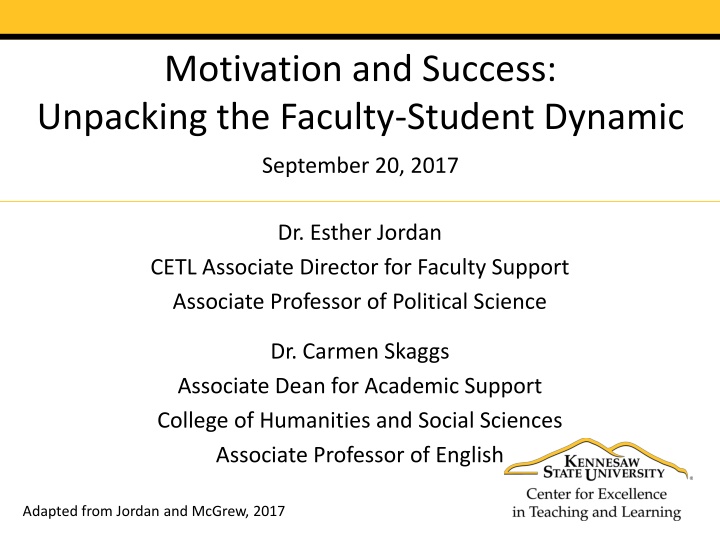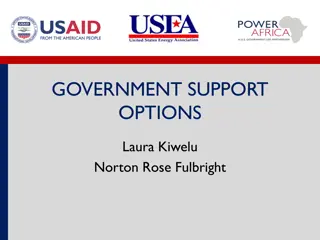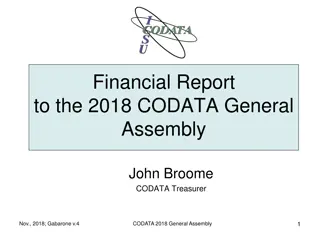
Unpacking Faculty-Student Dynamic: Motivation and Success Workshop Insights
Explore insights from the workshop on faculty-student dynamic, motivation theory, goal orientations, self-determination theory, and expectancy-value theory to enhance student learning and success. Join Dr. Esther Jordan and Dr. Carmen Skaggs in understanding the responsibilities and predictors of student motivation.
Download Presentation

Please find below an Image/Link to download the presentation.
The content on the website is provided AS IS for your information and personal use only. It may not be sold, licensed, or shared on other websites without obtaining consent from the author. If you encounter any issues during the download, it is possible that the publisher has removed the file from their server.
You are allowed to download the files provided on this website for personal or commercial use, subject to the condition that they are used lawfully. All files are the property of their respective owners.
The content on the website is provided AS IS for your information and personal use only. It may not be sold, licensed, or shared on other websites without obtaining consent from the author.
E N D
Presentation Transcript
Motivation and Success: Unpacking the Faculty-Student Dynamic September 20, 2017 Dr. Esther Jordan CETL Associate Director for Faculty Support Associate Professor of Political Science Dr. Carmen Skaggs Associate Dean for Academic Support College of Humanities and Social Sciences Associate Professor of English Adapted from Jordan and McGrew, 2017
Learning Objectives By the end of this workshop, faculty will be able to 1. distinguish faculty and student responsibilities for motivation and learning, apply motivation theory to resolve challenging student-faculty interaction cases in a learning- centered way, and apply motivation theory to lead students to take greater responsibility for learning. 2. 3.
Introductory Activity Write answers to each question on a separate post-it note, discuss with a partner, then hand in your note to the facilitator: 1. What is the professor responsible to do to motivate students to learn? 2. What is the student responsible to do to learn?
Measures of Motivation What tasks do students choose to complete that will enhance their learning? Choice How hard are students willing to work to complete those tasks? Effort If things get difficult, how long will students persist in order to get it right? Persistence Svinicki and McKeachie (2013)
Goal Orientations Performance Goals Mastery/ Learning Goals Extrinsic Intrinsic Gain deep understanding Get the grade Takes intellectual risks Gives the right answer Ambrose, et. al (2010)
Self-Determination Theory Predictors of Motivation Relatedness (relationship- building) Autonomy (choice & free will) Competency (mastery) Svinicki and McKeachie (2013),Ambrose,et. al (2010), Brophy (2004)
Expectancy-Value Theory Predictors of Motivation Value the Material & Activities Supportive Environment Expectation of Success Ryan & Deci 2017, Ford 1992
Application: Case Studies Activity Discuss your assigned case with a small group. 1. Is student learning the primary goal of the professor in the case? If not, what is? 2. How might motivation theory inform a way for the professor to respond to the situation to give more primacy to student learning?
Self-Evaluation and Planning Activity As an individual, complete the handout, Reflection: Motivation Theories and Student Success.
Please Complete the Feedback Form Thank you!
References Ambrose, S. A., et. al. (2010) How Learning Works: 7 Research-Based Principles for Smart Learning Brophy, J. (2004). Motivating students to learn (2nd ed.). Mahwah, New Jersey: Lawrence Erlbaum Associates. Ford, M.E. (1992). Motivating humans: Goals, emotions and personal agency beliefs. Newbury Park, CA: Sage Publications, Inc. McKeachie, W., & Svinicki, M. (2013). McKeachie's Teaching Tips: Strategies, Research and Theory for University Teachers ( 14th ed.). Belmont, CA: Wadsworth Publishers. Ryan, R. M., & Deci, E. L. (2017). Self-determination theory: Basic psychological needs in motivation, development, and wellness. Guilford Publications.







